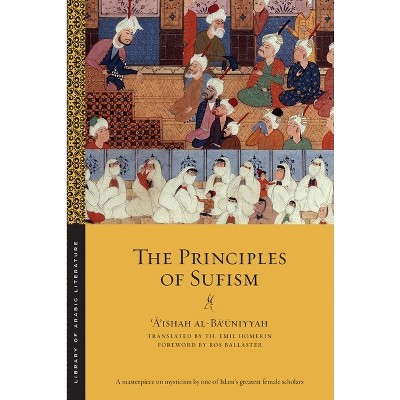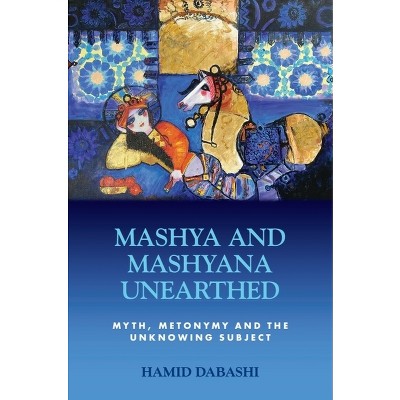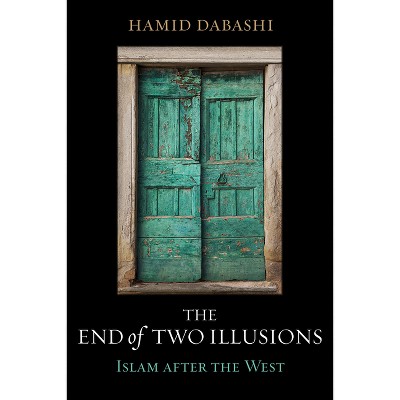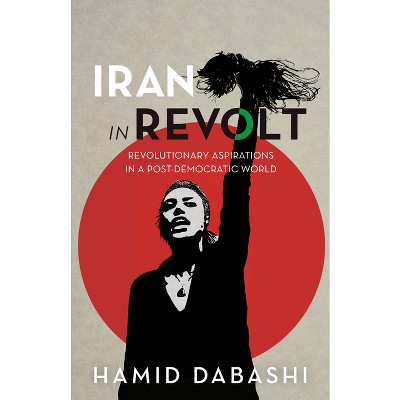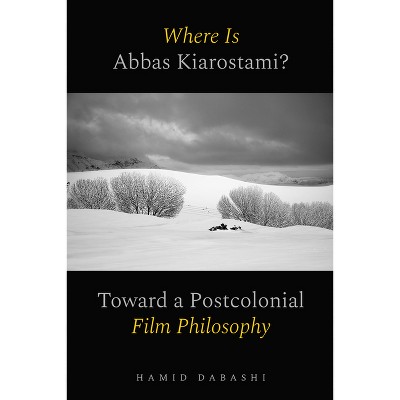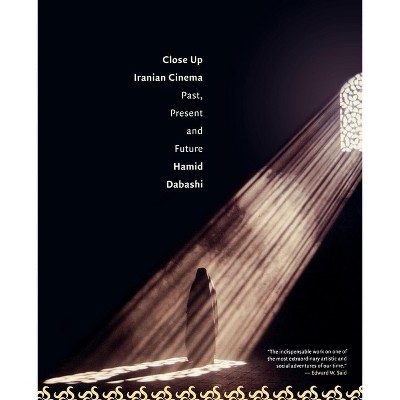Sponsored

The Shahnameh - by Hamid Dabashi (Hardcover)
$37.00
In Stock
Eligible for registries and wish lists
Sponsored
About this item
Highlights
- The Shahnameh, an epic poem recounting the foundation of Iran across mythical, heroic, and historical ages, is the beating heart of Persian literature and culture.
- About the Author: Hamid Dabashi is Hagop Kevorkian Professor of Iranian Studies and Comparative Literature at Columbia University.
- 272 Pages
- Literary Criticism, Middle Eastern
Description
About the Book
Hamid Dabashi insightfully traces the history, authorship, poetic significance, complicated legacy, and enduring significance of the Iranian epic poem the Shahnameh. In addition to explaining what makes it such a distinctive literary work, he makes a powerful case that we need to rethink the notion of "world literature" in light of the Shahnameh.Book Synopsis
The Shahnameh, an epic poem recounting the foundation of Iran across mythical, heroic, and historical ages, is the beating heart of Persian literature and culture. Composed by Abu al-Qasem Ferdowsi over a thirty-year period and completed in the year 1010, the epic has entertained generations of readers and profoundly shaped Persian culture, society, and politics. For a millennium, Iranian and Persian-speaking people around the globe have read, memorized, discussed, performed, adapted, and loved the poem.
In this book, Hamid Dabashi brings the Shahnameh to renewed global attention, encapsulating a lifetime of learning and teaching the Persian epic for a new generation of readers. Dabashi insightfully traces the epic's history, authorship, poetic significance, complicated legacy of political uses and abuses, and enduring significance in colonial and postcolonial contexts. In addition to explaining and celebrating what makes the Shahnameh such a distinctive literary work, he also considers the poem in the context of other epics, such as the Aeneid and the Odyssey, and critical debates about the concept of world literature. Arguing that Ferdowsi's epic and its reception broached this idea long before nineteenth-century Western literary criticism, Dabashi makes a powerful case that we need to rethink the very notion of "world literature" in light of his reading of the Persian epic.Review Quotes
Dabashi has been teaching the Shahnameh for several years now and in his previous books, he has written in detail about Persian culture and literary tradition. This expertise, combined with his lucid writing, brings the epic alive and makes the reader curious about the world in which it was written, -- "Asian Review of Books"
For those who wish to deepen their understanding of Persian poetry and literary history, The Shahnameh: The Persian Epic as World Literature makes a worthy companion to the English translation by Dick Davis.-- "Australian Book Review"
It is not preaching to the politically converted that achieves Dabashi's goal of compelling others to read Ferdowsi's epic. It is his love of his native epic coupled with his obvious gifts as a teacher that succeed where the tired cultural politics of the postcolonial academy fail. . . . Highly recommended.-- "Choice"
Monumental epic.--M. A. Orthofer "The Complete Review"
This enlightening scholarly study will serve, for most Western readers, as their introduction to the Persian Book of Kings. . . . Dabashi provides background on Ferdowsi and the pre-Islamic epic tradition that shaped his poem before sharing colorful accounts of its cast of warrior kings, rebellious offspring, and seductive courtesans.-- "Publishers Weekly"
A major achievement. With wit and erudition, Hamid Dabashi has pushed open one of the great locked doors of world literature: the Shahnameh. In bringing the central work of Persian literature vividly to life, he also offers us a new way to understand all epics. More likely, in Dabashi's brilliant reading, to undermine imperialistic ambitions than to proclaim them, the Shahnameh and its fellow epic poems reassert their relevance in our troubled times.--Aravind Adiga, author of The White Tiger
In The Shahnameh, Hamid Dabashi shows the global importance of the tenth-century Persian masterpiece and gives readers a strong sense of its literary magnificence. Dabashi allows us to see the world imagined by Abolqasem Ferdowsi in its richness and complexity eight centuries before Goethe made his influential claim for Weltliteratur and, thereby, helps us expand our sense of the world of literature. After reading Dabashi's magisterial account of the great Iranian epic, we must return to the ongoing debates in world literature anew. --Brian Edwards, author of After the American Century: The Ends of U.S. Culture in the Middle East
This is a work of imaginative activism. Hamid Dabashi coaxes and cajoles the reader to achieve the critical intimacy with the founding epic of Iran that he himself has acquired from childhood and through teaching and parenting. Historically conscientious, he is aware of the abuses of nationalism and triumphalism. His Shahnameh is a metaphysical epic of worthy failure. Such readings open many worlds, shaming the Eurocentric binaries of 'world literature.'--Gayatri Chakravorty Spivak, University Professor, Columbia University
This is a work of love and care on the foundational story telling of the Persianate. Dabashi guides the reader to avoid the traps of the Eurocentered idea of 'world literature.' He invites us to reimagine and rewrite it starting from the Shahanameh instead of from a canonical Western narrative. A powerful political statement that shifts the geography of 'world literature.'--Walter Mignolo, coauthor of On Decoloniality: Concepts, Analytics, Praxis
This is an important book that will make its readers reconsider what they think they know about Iran's national epic. It situates the poem in three contexts: The imperial world in which it was born, the world that it envisions, and the postcolonial world in which it is read and understood. Writing as a learned and passionate critic, Dabashi succeeds in placing the Shahnameh in the corpus of world literature, but somewhere beyond the reach of Eurocentrism. Like Dabashi's other works, it will stay with its readers, and will open new vistas for the specialist and the nonspecialist alike.--Mahmoud Omidsalar, author of Poetics and Politics of Iran's National Epic, the Shahnameh
About the Author
Hamid Dabashi is Hagop Kevorkian Professor of Iranian Studies and Comparative Literature at Columbia University. He is a founding member of the Institute for Comparative Literature and Society at Columbia University. Among his most recent books are The World of Persian Literary Humanism (2015) and Persophilia: Persian Culture on the Global Scene (2016).Dimensions (Overall): 9.1 Inches (H) x 6.2 Inches (W) x 1.0 Inches (D)
Weight: 1.15 Pounds
Suggested Age: 22 Years and Up
Number of Pages: 272
Genre: Literary Criticism
Sub-Genre: Middle Eastern
Publisher: Columbia University Press
Format: Hardcover
Author: Hamid Dabashi
Language: English
Street Date: January 8, 2019
TCIN: 82968330
UPC: 9780231183444
Item Number (DPCI): 247-19-2462
Origin: Made in the USA or Imported
If the item details aren’t accurate or complete, we want to know about it.
Shipping details
Estimated ship dimensions: 1 inches length x 6.2 inches width x 9.1 inches height
Estimated ship weight: 1.15 pounds
We regret that this item cannot be shipped to PO Boxes.
This item cannot be shipped to the following locations: American Samoa (see also separate entry under AS), Guam (see also separate entry under GU), Northern Mariana Islands, Puerto Rico (see also separate entry under PR), United States Minor Outlying Islands, Virgin Islands, U.S., APO/FPO
Return details
This item can be returned to any Target store or Target.com.
This item must be returned within 90 days of the date it was purchased in store, shipped, delivered by a Shipt shopper, or made ready for pickup.
See the return policy for complete information.
Frequently bought together

$10.38 - $23.82
was $18.00 - $38.00 New lower price
4.6 out of 5 stars with 193 ratings


